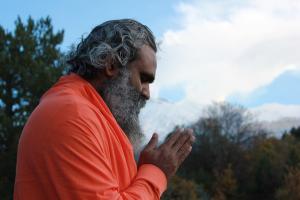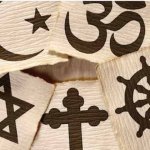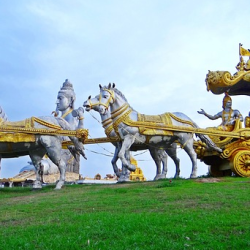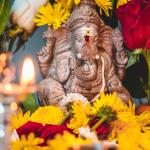When discussing the Hindu Dharma with my non-Hindu friends, they often express a bit of what is known in interfaith circles as “holy envy.” This is what we feel when we learn about an aspect of another religion that our tradition does not share.
But we admire it so much that we are a bit envious of the adherents to that faith. For instance, I have holy envy of the Jewish tradition of Bar/Bat Mitzvah. While there is an coming of age ceremony for young adults in Hinduism, I’m more attracted to how Jews do it.
But Jews, Christians and others in my life often return the sentiment by expressing appreciation for many Hindu traditions. What I often hear is that the absence of dogma, the various devotional practices, meditation and tradition of ahimsa (nonviolence) are things that resonate with many outside of the Dharma. However, one aspect that very few find appealing is the ages old institution of the guru-disciple relationship. This sacrosanct relationship is deeply embedded within Hinduism. For the most part, even devotees who might not have taken initiation still honor it.
A Time Honored Tradition
In Paramhansa Yogananda’s spiritual classic Autobiography of a Yogi the opening words drive home the importance of discipleship:
“The characteristic features of Indian culture have long been a search for ultimate verities and the concomitant disciple-guru 1 relationship. My own path led me to a Christlike sage whose beautiful life was chiseled for the ages. He was one of the great masters who are India’s sole remaining wealth. Emerging in every generation, they have bulwarked their land against the fate of Babylon and Egypt.”
There are several reasons for the suspicion most westerners have of this concept. For one, we are raised to embrace our individual freedom of thought. This is especially true in the more liberal spiritual expressions. Since the end of the 18th century, Unitarian Universalists and Hindus have been allies on many levels. As one might assume, we tend to part company on this issue.
Another very valid reason for eschewing the idea of having a spiritual master is that so many who have claimed this very elevated status have fallen short in maintaining the virtues we would expect. Even with years of study, austere living, meditation and so forth, holding firm to personal discipline and nonattachment. A constant flow of adulation from chelas can be very difficult to fight over time. And we have seen guru after guru fall by the wayside here in the United States, especially since Hinduism gained a level of popularity in the 1960s.
And Then There is Crazy
Some Buddhist and Hindu leaders have turned their peccadillos into virtues by claiming that they were practicing “Crazy Wisdom.” Teachers who adhere to this concept give themselves permission to flaunt the morals and mores of society. They claim that they can spiritually uplift disciples through intoxicants, sex and other questionable behaviors. Let’s just say that I’m not a fan.

While similar to a pastor, rabbi or imam stumbling or falling, the faiths they represent acknowledge that being human, they most certainly can sin. And if made aware of any improprieties, there are boards, denominations and synods that can hold the offender to task. This includes defrocking if needed. But a guru normally does not have any oversight. In addition, most devotees believe that their teacher is “enlightened.” That is, they have attained a state beyond the reach of maya (delusion).
Prospecting For Real Gold
While some searchers are exploited by those who exploit their gullibility, there is some good news as well. The Hindu tradition has held for ages the maxim that, “The existence of fool’s gold does not negate the existence of genuine, pure gold.” It is my very fallible opinion that in my life I have met a few truly sweet, humble and service minded souls who have made it their life’s work to bring others closer to the state of Self-realization. They do not seek publicity, undue prosperity or fame. Yes, with a somewhat crowded marketplace it can be a chore to find such a one. But as the Vedic proverb says, when the disciple is ready the guru will appear.
But there is one more thing that bothers many free-thinking occidentals: Why should I ever give my spiritual destiny over to someone else? This is my responsibility. And furthermore, I am not anyone automaton who will state dewy-eyed at some saffron robed mystic, taking every word they say as coming from the lips of God.
Fair enough. A person of integrity does not want to be viewed as weak-willed. And we should consider our individuality a gift, and not attempt to embrace any unexamined groupthink mentality. Tutelage under a true guru should result in an even stronger will that you had than when you started. Another sign of a genuine preceptor is that he or she should strongly encourage independence, not codependence. Gurus are not meant to solve every problem in your life. They provide tools. It has been my privilege to know a fair number of people who have embraced the guru-disciple relationship and are able to express this noble trait.
Let There Be Light
The word guru means “one who dispels darkness.” That is a very powerful sentiment. The spiritual path is also said to be like a razor’s edge. There are always risks. We should begin our journey fully aware of them. And one more thing: I have spoken to people who did have past relationships with “gurus” who didn’t measure up. Some walked away from exploring the transcendent for good. But others emerged with a bit more light in their eyes. While seeing the very flawed individual unmasked, they did not feel their time wasted. There were lessons learned, and in some cases, a path forward.
If you are contemplating seeking the guidance of a guru, I wish you the very best. May Light prevail in your life.


















